2015年11月アーカイブ
2015年11月27日
Introduction
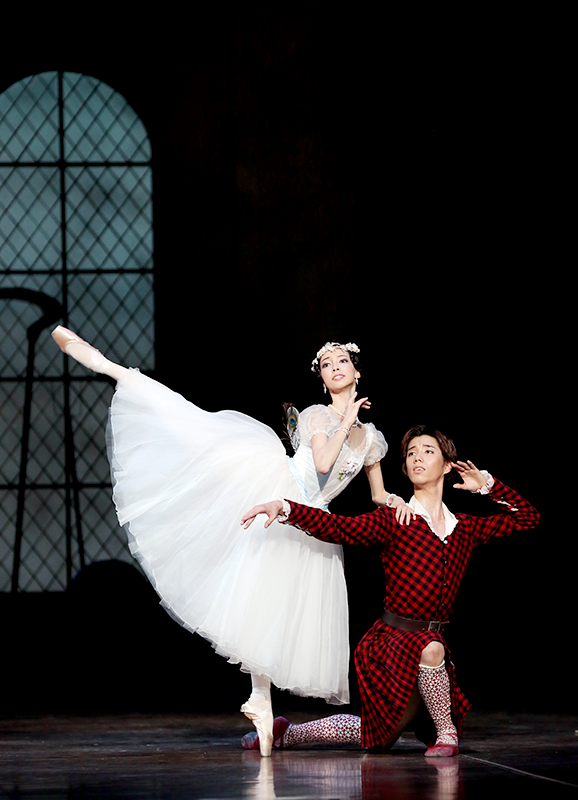
Photoï¼Kiyonori Hasegawa
The second show under the Tokyo Ballet's new artistic director, Yukari Saito, is the masterpiece of Romantic ballet, La Sylphide (The Sylph), a piece that is one of her specialties, as she has performed in it many times.
Saito danced the original in venues such as the Bolshoi Theatre and the Mariinsky Theatre, where she was highly praised and even called the "Marie Taglioni of Japan." Saito gained the trust of choreographer Pierre Lacotte while working as his assistant with the Moscow Musical Theatre Ballet, and she was entrusted with the direction of the Tokyo Ballet for the first time in 2013.
Now that Saito is the artistic director, she has been working with the dancers to guide and direct them, based on her own onstage experience.
The dancers that Saito has cast for the first night are Rie Watanabe, who has previously garnered good reviews for her superior flexibility, dexterity, and graceful charm, and the fresh Arata Miyagawa, who has attracted attention with his high level of physical ability and perfectly practiced movements. On the second night, the highly successful pair from the previous production, Kanako Oki and Daichi Matsuno, take to the stage again. The perfectly proportioned Oki's greatest gifts include her grace and the well-defined clarity of her technique, honed in Russia. Matsuno, with his sweet and gentle classical look, shows his dynamism and lightheartedness, putting his height to good use.
La Sylphide is the story of a young man named James who backs out of his wedding, having fallen in love with a sylph, a mysterious woodland spirit. Every detail of the Romantic ballet aesthetic is reproduced in this production, giving it the unique style and beauty of the classical ballet blanc. The piece also features group dances, a particular point of pride for the Tokyo Ballet.
This production of La Sylphide from the Tokyo Ballet offers the new artistic director, Yukari Saito, a chance to exercise her remarkable skills, and ballet-goers have plenty to look forward to.
Introduction
The Brilliant New Artistic Director, Yukari Saito, Spreads Her Wings
Don't Miss the First Performance of the Vladimir Bourmeister Staging of Swan Lake!
Having served for many years as the prima ballerina of the Tokyo Ballet, Yukari Saito assumed the position of the troupe's artistic director this past August. This performance will be the first major project under her charge. In addition to her abundant experience as a dancer, her profound understanding of the culture of ballet, and her training as a ballet master in Russia, Saito has already received high praise for her backstage involvement in productions at the Moscow Musical Theater Ballet and in productions of La Sylphide and Don Quixote at the Tokyo Ballet. With this production, Saito will display the full potential of her celebrated genius.
What makes Vladimir Bourmeister's staging of Swan Lake so enchanting is encapsulated in the choreographer's own words: "The dancer must live the life of the character he is playing onstage." Bourmeister had studied theater before becoming acquainted with ballet. In contrast to the 19th-century Petipa-Ivanov revival staging--which emphasized formal beauty--Bourmeister faithfully reproduced Tchaikovsky's original intent by adhering to the dramaturgy of the composer's original score, thereby restoring a dramatic narrativity to the ballet. This staging was a major success worldwide, and it has earned the distinction of being a masterpiece production.
The Tokyo Ballet has received acclaim for its stagings of numerous classical ballets and, in more recent years, dramatic ballets, including Onegin and Romeo and Juliet. Now that the Tokyo Ballet has gained Yukari Saito as its new artistic director--shortly after the troupe's 50th anniversary--this truly presents the peak opportunity to perform the Bourmeister version of Swan Lake, which combines the classical with the dramatic.
This performance will have three pairs of lead performers: Mizuka Ueno and Dan Tsukamoto, who continue their glamorous presence as the Tokyo Ballet's top duo; Rie Watanabe, acclaimed for her graceful dancing in La Sylphide and Giselle, paired with the notable Yasuomi Akimoto, who joined the troupe after receiving overwhelming praise for his ability in the August auditions; and Mamiko Kawashima plus Hideo Kishimoto, who were celebrated for their elegant performances in the February production of The Sleeping Beauty.
Expect a new era for the Tokyo Ballet in 2016, ushered in with the Bourmeister-staged version of Swan Lake.

What Is the Bourmeister Version of Swan Lake?
This dramatic staging of Swan Lake (first performed in 1953) by Russian choreographer Vladimir Bourmeister was a worldwide success. Bourmeister went back to Tchaikovsky's original score, heightening the drama and changing the greatest highlight of the ballet--the third act--into a dramatic development in which folk dancers become the devil's minions and bewitch the prince. In 1960, the Paris Opera adopted this version for its first production of Swan Lake. The staging also became part of the repertoire of La Scala Theatre Ballet in Milan.

Yukari Saito, Artistic director of the Tokyo Ballet
Saito joined the Tokyo Ballet in 1987 and went on to perform as a prima ballerina for many years. With her poetic and graceful dancing and dramatic expressiveness, she immediately blossomed into a star performer. She has played the lead role in all the major classical full-length ballets. In 2010, Saito won the 27th Chieko Hattori Ballet Prize, the Tokyo Shimbun Dancing Arts Award, and the Yokohama Cultural Award for her performance as Tatiana in Onegin. She has also performed works by Béjart, Kylián, and Neumeier, and she has given numerous guest performances overseas. In 2005, she graduated top of her class from the Moscow State Academy of Choreography (the Bolshoi Ballet Academy) and went on to gain experience as a ballet instructor at the Moscow Musical Theater Ballet. In 2012, Saito won the Medal with Purple Ribbon awarded by the Japanese government. She became the artistic director of the Tokyo Ballet in August 2015.
Schedule
Date
Friday 5 February 2016, 6:30p.m.
Saturday 6 February 2016, 2:00p.m.
Sunday 7 February 2016, 2:00p.m.
Venue
Tokyo Bunka Kaikan (Ueno)
Cast
Odette/Odile : Mizuka Ueno
Prince Siegfried : Dan Tsukamoto
Saturday 6 February
Odette/Odile : Rie Watanabe
Prince Siegfried : Yasuomi Akimoto
Sunday 7 February
Odette/Odile : Mamiko Kawashima
Prince Siegfried : Hideo Kishimoto
Admission (tax inclusive)
| Category S | S=Â¥12,000 |
| Category A | A=Â¥10,000 |
| Category B | B=Â¥8,000 |
| Category C | C=Â¥6,000 |
| Category D | D=Â¥4,000 |
| Category E | E=Â¥3,000 |
All tickets go on sale at 10:00 AM on October 31! Book now
 To buy Ticket for inquiries, contact
To buy Ticket for inquiries, contact
Japan Performing Arts Foundation(NBS) |
Schedule
Date
Friday 29 April 2016, 2:00p.m.
Saturday 30 April 2016, 2:00p.m.
Venue
Tokyo Bunka Kaikan (Ueno)
Cast
La Sylphide : Rie Watanabe
James : Arata Miyagawa
Saturday 30 April
La Sylphide : Kanako Oki
James : Daichi Matsuno
Admission (tax inclusive)
| Category S | S=Â¥10,000 |
| Category A | A=Â¥8,000 |
| Category B | B=Â¥6,000 |
| Category C | C=Â¥5,000 |
| Category D | D=Â¥4,000 |
| Category E | E=Â¥3,000 |
All tickets go on sale at 10:00 AM on December 5! Book now
 To buy Ticket for inquiries, contact
To buy Ticket for inquiries, contact
Japan Performing Arts Foundation(NBS) |
2015年11月26日
Introduction
Ladies and gentlemen, the operetta begins!
Let's pop open the champagne as though times are booming!
Spring 2016 will see the arrival in Japan of the Volksoper Wien, followed in the fall by the arrival of Wiener Staatsoper, making it the "Year of Vienna" in Japan. If the Wiener Staatsoper is a rich and mellow glass of fine wine, the Volksoper Wien would have to be a delightful flute of champagne.
In today's world, it seems as though many people feel that life just keeps getting harder and harder. There must be quite a few who would like to brighten up the day's gloom, even if just for a while. An operetta is like a wonder drug for such people.
It is said, "An operetta is an encyclopedia of love." On stage, the battle for love is fought by various means; the audience experiences a love unthinkable in reality. The waltzes, polkas, and other rhythmic music that could only be Viennese--bubbling like champagne--dazzle as they underscore the love. An operetta has the happy ending of a slapstick comedy. There is no doubt that one can taste that sense of happiness that feels as if you're drunk on fine champagne.
This temple of the operetta, the Volksoper Wien, is descended from a theater that opened in 1898, during the reign of Emperor Franz Joseph I. Its prestigious halls survived two world wars. Currently, in the musical capital of Vienna, the Volksoper Wien is the second largest musical theater, after the Wiener Staatsoper, serving as the face of city. To fully display the appeal of the operetta form, singers are required not just to have vocal talent but also acting chops and the ability to ad lib. They say that comedy is more difficult than tragedy for performers. Indeed, the full complement of skills displayed by the orchestra and performers of an operetta--a form in which laughs are essential and the happy ending must delight the audience--is on a par with that required to perform the major operas.
Love begins with champagne. Come and have your heart beat to the struggles for love played out on the stage. Raise a glass to an extraordinary, exuberant life! Through operetta, one can bring more joy to one's real life.

2015年11月25日
Liliom
The source for the musical masterpiece Carousel, now turned into a ballet with music by film score maestro Michel Legrand!
The moving story of the Ruffian Liliom bringing his ill-fated love from the "Next World"
Liliom Ballet in 7 Scenes and a Prologue (1 intermission)
Original storyï¼Ferenc Molnár
Musicï¼Michel Legrand
Choreography, Costumes, Lightï¼John Neumeier
Setï¼Ferdinand Wögerbauer
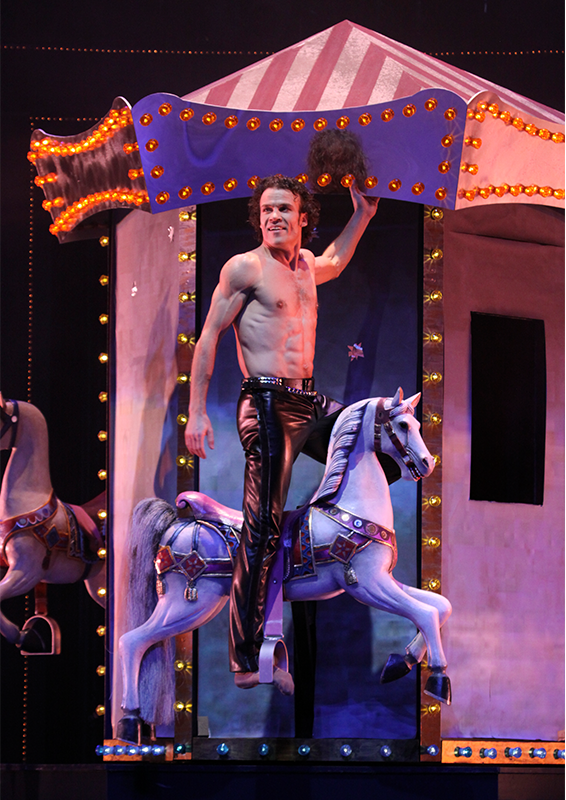
Photoï¼Holger Badekow
One of John Neumeier's more recent works, Liliom turns Ferenc Molnár's drama--the basis for Rodgers and Hammerstein's Broadway musical masterpiece Carousel--into a movingly staged ballet. Neumeier--whose passions were stirred watching Carousel as a boy in the land of his birth, the USA--said that he was moved even further upon reading the play on which the musical was based and that he aspired to someday take it on himself.
During the Great Depression of the 1930s, the high-spirited ruffian Liliom lives a humble life with his lover Julie. But when he loses his job and becomes a thief to provide for the child whom Julie will bear, his failure and subsequent despair drive him to suicide. Allowed to return temporarily from "the next world" to the world of the living, Liliom is shaken to learn that his son, who resembles him, is now in the same situation. When it appears as though Liliom and Julie's tragic love and way of living may be passed down to the next generation, a "star" that Liliom brings from the next world gives rise to a ray of hope, bringing forth much excitement.
Much attention was given at the premiere to the fact that Neumeier commissioned the master film composer Michel Legrand--known for such tours de force as the soundtrack to The Umbrellas of Cherbourg--to write all the music for the show. Legrand's jazz-tinged score richly conveys the ambiance of the period as it rises to its crescendo. The Hamburg-based Norddeutscher Rundfunk (NDR) Bigband, which has performed this set on stage since the first performance, will also bring its stylings to the Japanese production.
Alina Cojocaru--the talented star who was once the top principal at the Royal Ballet in the UK and now dances for the English National Ballet, in between the numerous guest performances entrusted to her by Neumeier--played Liliom's wife, Julie, at the premiere of the ballet. Cojocaru is slated to play the part in every performance in Japan. Liliom promises tears and emotion. Do not miss out!
Plot
Liliom, a carnival barker, rescues Julie from the clutches of a drunken sailor and falls in love with her. The two begin to live together. Mrs. Muskat, who is both Liliom's employer and his former lover, fires Liliom, forcing him and Julie into a life of struggle. The two are unable to express their feelings to one another candidly. Liliom ends up hitting Julie over a trifling matter. And yet when he learns that she is with child, he has hope for their future. However, the villainous Fiscur entices Liliom into working for him as a thief. When this fails, Liliom commits suicide in despair.
After judgment in the next world, Liliom is trapped in purgatory. Sixteen years later, Liliom is permitted to return to Earth for a brief moment. Bearing a star from heaven as a memento, he meets his now grown-up son. However, his son--in just as much turmoil as his father was--rejects Liliom, who stikes his son out of despair and rage. Julie then appears, and she perceives both Liliom's worries and his love.
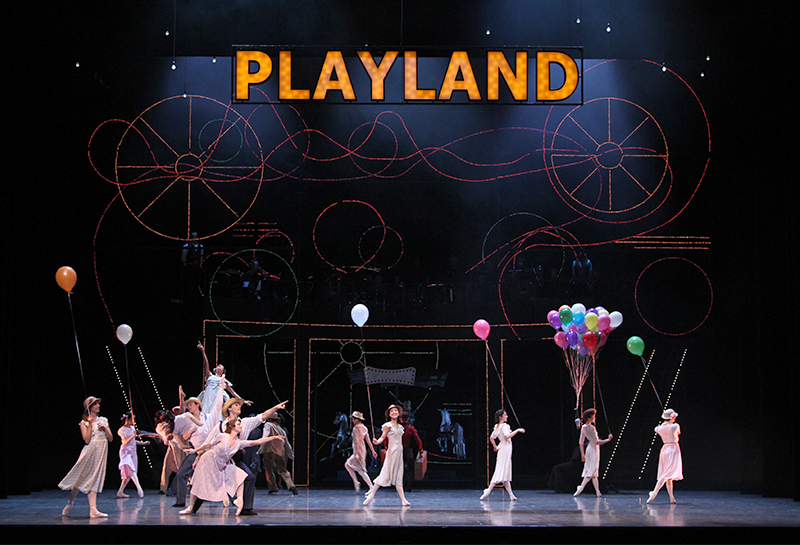
Photo:Holger Badekow
Cast
Friday March 4, 6:30pm
Liliomï¼Carsten Jungãï¼ãJulieï¼Alina Cojocaru
Saturday March 5, 2pm
Liliomï¼Carsten Jungãï¼ãJulieï¼Alina Cojocaru
Sunday March 6, 2pm
Liliomï¼Carsten Jungãï¼ãJulieï¼Alina Cojocaru
Die Csárdásfürstin
The songstress known as the "Princess of the Csárdás" and a young Austrian aristocrat.
The twists and turns of two lovers from different stations in life play out in Vienna and Budapest.
Conducted by "the king of the operetta," Rudolf Bibl, artful singers perform an abundance of csárdáses and waltzes, singing, dancing, and enchanting!
Die Csárdásfürstin Operetta in 3 Acts
Composed byï¼Emmerich Kálmán
Directed byï¼Robert Herzl
ï¼»Length of performanceï¼approx. 3 hours including one intermissionï¼½
Today, the marriage between a young Viennese aristocrat and a famous songstress from Budapest would be a celebrity marriage at the center of the public eye, but things were very different on the eve of World War I. Upon learning--despite having gone so far as to sign marriage documents with the man--that her lover Edwin has a fiancée, Sylva is left hopeless against the dominating forces of society and departs for a location far away. Sylva is the one who lives a life of purity and love. Edwin, seeing Sylva before him in the guise of a "countess," has the temerity to say that there would be no problem in him marrying a divorced noblewoman--as opposed to a gypsy--enraging Sylva. The woman declares that she will return to being the princess of the csárdás. Though they love one another, they come from different worlds. The tangled threads of the couple's emotions are tamed through a startling development: It is discovered that Edwin's mother was a legendary songstress. There awaits a happy ending in which everyone beams in delight.
In addition to the exotic rhythm of the Hungarian folk music, the csárdás and the enchanting tones of the Viennese waltz, the expert dancing of the accomplished Volksoper singers is not to be missed. You will be intoxicated by the conducting of the maestro Rudolf Bibl--known as "the king of the operetta." Just a month after the centennial of the piece's premiere, in December 2015, a whole new version of Die Csárdásfürstin will appear on stage.



Conductorï¼Rudolf Bibl
CAST
| Leopold Mariaï¼ | Wolfgang Hübsch |
| Anhilteï¼ | Maria Happel |
| Edwin Ronaldï¼ | Carsten Süssï¼5/14, 16ï¼ Szabolcs Bricknerï¼5/15ï¼ |
| Anastasia Komtesse Eggenbergï¼ | Beate Ritterï¼5/14, 16ï¼ Mara Mastalirï¼5/15ï¼ |
| Eugen Baron Rohnsdorffï¼ | Karl-Michael Ebner |
| Boni Graf Káncsiánuï¼ | Marco Di Sapiaï¼5/14, 16ï¼ Michael Havlicekï¼5/15ï¼ |
| Ferenc Ritter Kerekes genannt Feri Bácsiï¼ | Axel Herrigï¼5/14, 16ï¼ Kurt Schreibmayerï¼5/15ï¼ |
| Sylva Varescuï¼ | Andrea Rostï¼5/14, 16ï¼ Ursula Pfitznerï¼5/15ï¼ |
| Siggi Grossï¼ | Boris Eder |
| Sándor von Kissï¼ | Daniel Ohlenschläger |

Szabolcs Brickner

Marco Di Sapia

Maria Happel

Michael Havlicek

Axel Herrig

Mara Mastalir

Wolfgang Hübsch

Ursula Pfitzner

Beate Ritter

Andrea Rost

Kurt Schreibmayer

Carsten Süss
2015年11月24日
Die Fledermaus
The "Operetta King" delivers the absolute masterpiece of the Viennese operetta!
The fresh appeal lasts no matter how many times you see it, no matter how many times you hear it.
Let yourself be intoxicated by the dazzling waltzes and polkas, fall off your seat laughing at the acting by accomplished singers,
and indulge in the apex of the operetta form!
And all hail, hail at the end: "It was all the champagne's fault!"
Die Fledermaus Operetta in 3 Acts
Composed byï¼Johann Strauss II
Directed byï¼Heinz Zednik
A grand ball is held at a prince's villa on New Year's Eve. A husband and wife both attend, each under a false name. Over the course of the night, the husband attempts to woo a woman, who turns out to be his wife!ã
This situation has all been crafted for the purpose of revenge by a man who has been cursed with the nickname "the Bat" because of a prank the husband played on him before. The husband, artfully caught in flagrante delicto in his infidelity, is forgiven by his wife: "It was all because you were drunk on champagne." The curtain falls. Such profound love! And all so smartly dressed!ã
A favorite of the legendary conductor Carlos Kleiber, Die Fledermaus is a roller coaster ride of waltzes and polkas, one right after the other. As if that weren't enough, the magic of Johann Strauss II's music gently warms everyone to their core. Die Fledermaus performed by the Volksoper's masterful singers is an unequaled performance that will make you gasp, "Nothing else would do!"--no matter how many times you witness the dances and hear the songs. There will be considerable buzz for the production in Japan, as global opera house star Angelika Kirschlager will be playing Orlofsky. The gorgeous parade of stars--unrivalled by even the Austrian production--doubles the allure.



Conductorï¼
Alfred Eschwé
ï¼5/19,20ï¼

Conductorï¼
Gerrit PrieÃnitz
ï¼5/21,22ï¼
CAST
| Eisensteinï¼ | Jörg Schneider
ï¼5/19, 21ï¼ Carsten Süss ï¼5/20, 22ï¼ |
| Rosalindeï¼ | Melba Ramos
ï¼5/19, 21ï¼ Elisabeth Flechl ï¼5/20, 22ï¼ |
| Adeleï¼ | Anja-Nina Bahrmann
ï¼5/19, 22ï¼ Rebecca Nelsen ï¼5/20ï¼ Beate Ritter ï¼5/21ï¼ |
| Idaï¼ | Martina Dorak |
| Dr Falkeï¼ | Marco Di Sapia
ï¼5/19ï¼ Mathias Hausmann ï¼5/20, 22ï¼ Daniel Ochoa ï¼5/21ï¼ |
| Orlofskyï¼ | Angelika Kirchschlager
ï¼5/19, 20, 22ï¼ Martina Mikelicï¼5/21ï¼ |
| Alfredï¼ | Rainer Trost
ï¼5/19, 20, 22ï¼ Vincent Schirrmacher ï¼5/21ï¼ |
| Iwanï¼ | Heinz Fitzka
ï¼5/19, 20ï¼ Mamuka Nikolaishvili ï¼5/21, 22ï¼ |
| Frankï¼ | Kurt Schreibmayer
ï¼5/19, 21ï¼ Daniel Ohlenschläger ï¼5/20, 22ï¼ |
| Blindï¼ | Boris Eder
ï¼5/19, 21ï¼ Karl-Michael Ebner ï¼5/20, 22ï¼ |
| Froschï¼ | Robert Meyer |

Anja-Nina Bahrmann

Marco Di Sapia

Elisabeth Flechl

Mathias Hausmann

Angelika Kirchschlager

Robert Meyer

Martina Mikelic

Rebecca Nelsen

Melba Ramos

Beate Ritter

Vincent Schirrmacher

Jörg Schneider

Kurt Schreibmayer

Carsten Süss

Rainer Trost
2015年11月23日
A Midsummer Night's Dream
Nobles, fairies, and amusing mechanicals...
The dreamlike, festive ballet that expresses the Three Worlds created by the magic of the Bard's words in three dance styles and with three genres of music
A Midsummer Night's Dream Ballet in 2 Acts and a Prologue (1 intermission)
Original storyï¼William Shakespeare
Musicï¼Felix Mendelssohn Bartholdy, György Ligeti, and traditional mechanical music
Choreography, Stagingï¼John Neumeier
Set, Costumesï¼Jürgen Rose
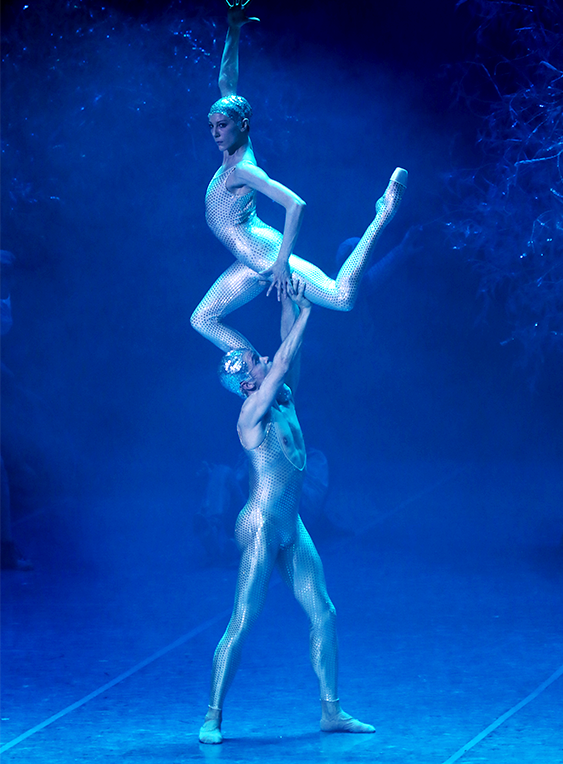
Photoï¼Holger Badekow
A Midsummer Night's Dream, staged by John Neumeier when he was just 35, is a dazzlingly festive ballet that gives form to the worlds of Shakespeare's famous comedy through a young choreographer's exuberant creativity and raw emotion.
The likes of Ashton and Balanchine had already produced great pieces within the ballet world based on the same play. What is notable about Neumeier's version is that the choreographer devised a way of more faithfully expressing the view of the world that Shakespeare painted with his words.
The inhabitants of the three worlds--the down-to-earth people, the comical Mechanicals, and the mystical fairies--each express themselves through entirely different music and dancing. The betrothed Athenian nobles Theseus and Hippolyta, as well as the two other couples, perform a stately classical dance to Mendelssohn's bright score. Bottom and the other merry Mechanicals, attempting to stage a play at Theseus and Hippolyta's wedding, play primitive barrel organs and perform comical sketches. Finally, the forest-dwelling fairy king and queen, as well as their servants, dance, with a great deal of jumping and dynamic lifting, to Ligeti's mysterious electronic tones.
In the climactic wedding scene, following the courtiers' dance and the Mechanicals' farce, the occasion concludes with a bright pas de deux by Theseus and Hippolyta, appearing entirely as the grand finale of a classical ballet. However, the subsequent epilogue, featuring Oberon and Titania, vividly illustrates that this bright reality is underpinned by the power of "The Dream." This masterpiece weaves Shakespeare's worlds into a single dreamlike tapestry of different styles of performance in a spectacular work of ballet. It is not to be missed!
Plot
It is the eve of the wedding of the Duke of Athens, Theseus, and his bride, Hippolyta. Helena and her former fiancé, Demetrius--who is now in love with Hermia--as well as Hermia herself and her lover, Lysander, are in a tangled web of love. The Mechanicals offer up the script of the play they will perform at the wedding banquet. Hippolyta falls asleep while doubting the true affections of Theseus's heart.
Meanwhile, in the forest, the fairy king Oberon and his queen Titania are quarreling. Oberon gives a magical flower to Puck, intending for it to be used to punish Titania. In the same woods, Hermia and Lysander are trysting when Demetrius and Helena appear, following their tracks. Through Puck's misapprehension, the magic flower throws the relationships among the four youths into further disarray, and Puck's mischief leads him to change the Mechanical Bottom's head into that of a donkey. Awakened from her sleep, an enchanted Titania falls for the donkey-headed Bottom. Oberon rebukes Puck and has him settle the relationships among the four youths, and all confusion is lifted with the dawn. Hippolyta and Theseus fall deeper in love, and the two young couples gain permission to wed, leading to celebrations.
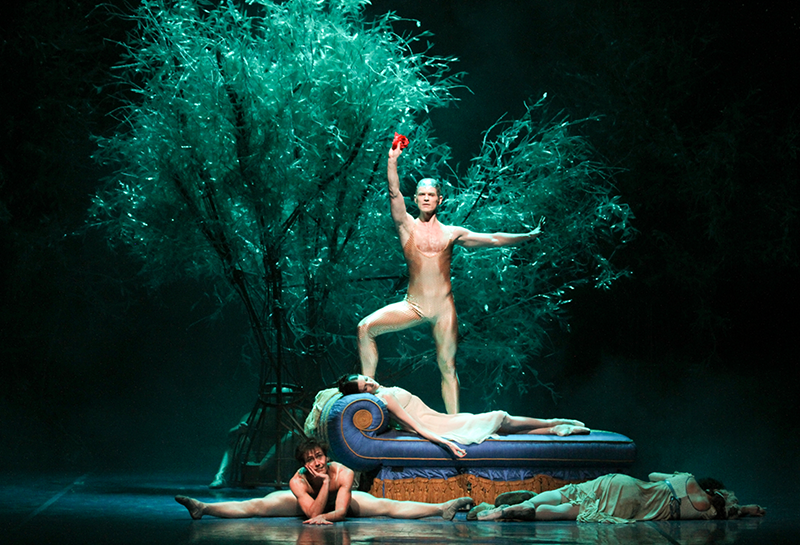
Photo:Holger Badekow
Cast
Friday March 11, 6:30pm
| Hippolyta/Titaniaï¼Hélène Bouchet | ï¼ | Theseus/Oberonï¼Edvin Revazov |
| Helenaï¼Silvia Azzoni | ï¼ | Demetriusï¼Alexandre Riabko |
| Hermiaï¼Anna Laudere | ï¼ | Lysanderï¼Christopher Evans |
Saturday March 12, 2pm
| Hippolyta/Titaniaï¼Alina Cojocaru | ï¼ | Theseus/Oberonï¼Carsten Jung |
| Helenaï¼Leslie Heylmann | ï¼ | Demetriusï¼Karen Azatyan |
| Hermiaï¼Florencia Chinellato | ï¼ | Lysanderï¼Jacopo Bellussi |
Sunday March 13, 2pm
| Hippolyta/Titaniaï¼Hélène Bouchet | ï¼ | Theseus/Oberonï¼Edvin Revazov |
| Helenaï¼Carolina Agüero | ï¼ | Demetriusï¼Alexandre Riabko |
| Hermiaï¼Anna Laudere | ï¼ | Lysanderï¼Christopher Evans |
Die lustige Witwe
A man and a woman who cannot be honest with one another. A wife and a youth whose flings and true intentions do not match.
The decadent wit of Paris. The gorgeous cancan at Maxim's. How will men and women's struggles over love turn out?
In response to overwhelming demand, there will be an encore performance of the most-loved operetta in the world, The Merry Widow.
Die lustige Witwe Operetta in 3 Acts
Composed byï¼Franz Lehár
Directed byï¼Marco Arturo Marelli
ï¼»Length of performanceï¼approx. 3 hours including one intermissionï¼½
The Merry Widow is filled with the maneuvers of love between men and women, showcasing the battle for romance fought by two couples: Danilo and Hanna are fond of one another but both have trouble expressing how they truly feel, while Valencienne and Rosillon are caught in a tryst. Throughout the story, each man and woman refuse to act as their partners wish, inflaming the others' emotions and finally leading to a happy ending in which a woman's stratagem results in a man revealing how he really feels.ã
Through its stage artistry and the refined beauty of its costumes, this production has all the style necessary to portray the battle for love among adults. Enjoy being mesmerized by the sweet, beautiful tones of the well-known theme, "The Merry Widow Waltz," and enjoy whistling at the extravagant cancan dance.ã
The Merry Widow was performed four years ago in Japan to high acclaim. It was broadcast on television and stirred up many wishes for a revival. The world's most beloved Viennese opera, The Merry Widow, is the Volksoper's most confidently performed piece. This time, let's gather to rejoice in the bubbling joy of the performance, not on the small screen but on the grand stage!



Conductorï¼Alfred Eschwé
ï¼5/19,20ï¼
CAST
| Baron Mirko Zetaï¼ | Andreas Mitschke
ï¼5/26, 28ï¼ Kurt Schreibmayer ï¼5/27, 29ï¼ |
| Valencienneï¼ | Julia Koci
ï¼5/26, 28ï¼ Mara Mastalir ï¼5/27, 29ï¼ |
| Hanna Glawariï¼ | Ursula Pfitzner
ï¼5/26, 28ï¼ Caroline Melzer ï¼5/27, 29ï¼ |
| Graf Danilo Danilowitschï¼ | Mathias Hausmann
ï¼5/26, 28ï¼ Marco Di Sapia ï¼5/27, 29ï¼ |
| Camille de Rosillonï¼ | Vincent Schirrmacher
ï¼5/26, 28ï¼ Mehrzad Montazeri ï¼5/27, 29ï¼ |
| Vicomte Cascadaï¼ | Christian Drescher
ï¼5/26, 27ï¼ Michael Havlicek ï¼5/28, 29ï¼ |
| Raoul de St. Briocheï¼ | Roman Martin
ï¼5/19, 20, 22ï¼ Christian Drescher ï¼5/28, 29ï¼ |
| Bogdanowitschï¼ | Karl-Michael Ebner |
| Sylvianeï¼ | Martina Mikelic |
| Kromowï¼ | Daniel Ohlenschläger |
| Olgaï¼ | Beate Ritter
ï¼5/26, 27ï¼ Martina Dorak ï¼5/28, 29ï¼ |
| Pritschitschï¼ | Josef Luftensteiner |
| Praskowiaï¼ | Regula Rosin |
| Njegusï¼ | Robert Meyer |

Marco Di Sapia

Mathias Hausmann

Michael Havlicek

Julia Koci

Mara Mastalir

Caroline Melzer

Robert Meyer

Martina Mikelic

Mehrzad Montazeri

Ursula Pfitzner

Vincent Schirrmacher

Kurt Schreibmayer
2015年11月21日
Gala
Gala - The World of John Neumeier
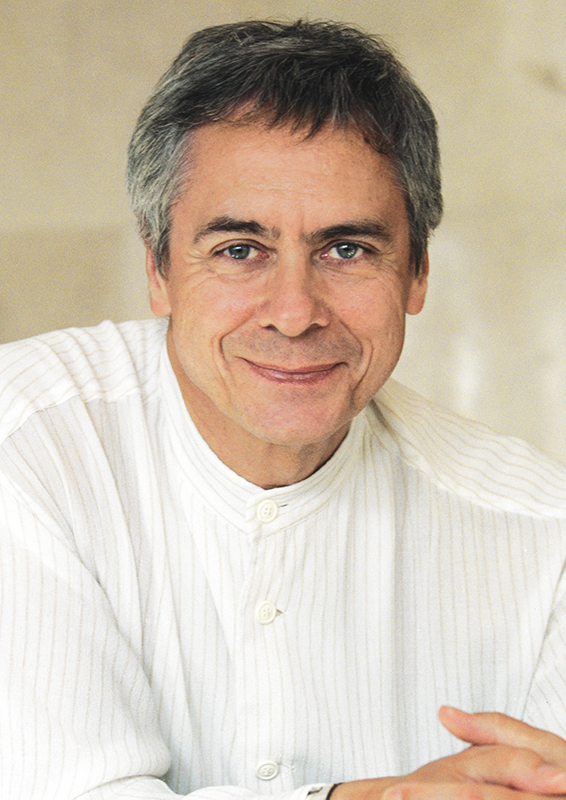
Photoï¼Holger Badekow
John Neumeier sometimes uses elaborate staging and dramatic theatrical tricks to make his audience appreciate humanity, and he finds a rich world of emotions within music through his keen understanding of aesthetics and trenchant interpretations. At the gala performance of The World of John Neumeier, ballet fans will be able to experience in full the world of this singular choreographer--supported more by aficionados of the craft than any other ballet choreographer or esteemed company worldwide--as well the power of his ballet troupe.
This program is more than just a performance of a few highlights: Neumeier will intersperse the story of his life--devoted to the art of ballet--with fragments from his fertile body of work. The gala will begin with a word from the choreographer himself. It will proceed with a medley from a wide range of works. There will be narrative ballets, including Lady of the Camellias, in which two young lovers must face their own psyches; Nijinsky, which depicts the fierce soul of the legendary, brilliant dancer; and The Nutcracker, which expresses Neumeier's love of ballet. There will also be symphonic ballets, including Third Symphony by Gustav Mahler and Saint Matthew Passion, which give form to the worlds of great composers' music through Neumeier's unique approach. In a cameo appearance, Alina Cojocaru--accompanied by the dancers of the Hamburg Ballet, who have received the tutelage of Neumeier and boast high degrees of expressiveness--will perform the succession of masterpieces. Come and enjoy the grand and enchanting World of Neumeier.
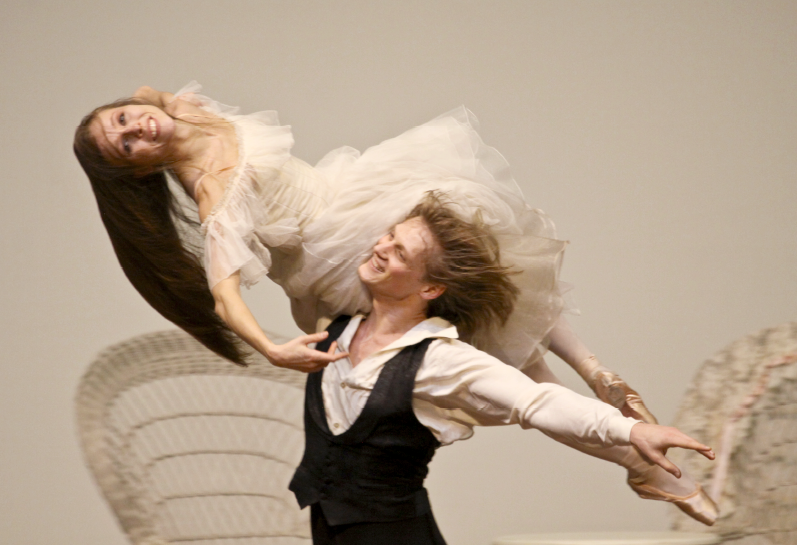
Lady of the Camellias
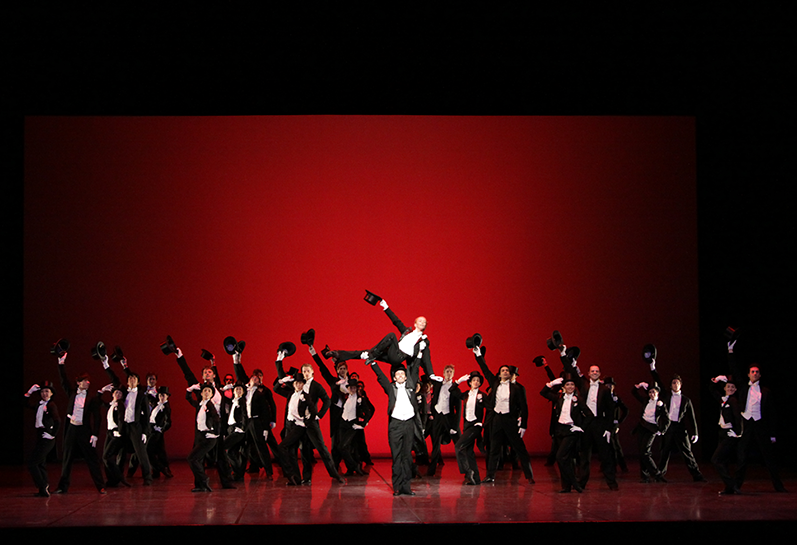
I got Rhythm
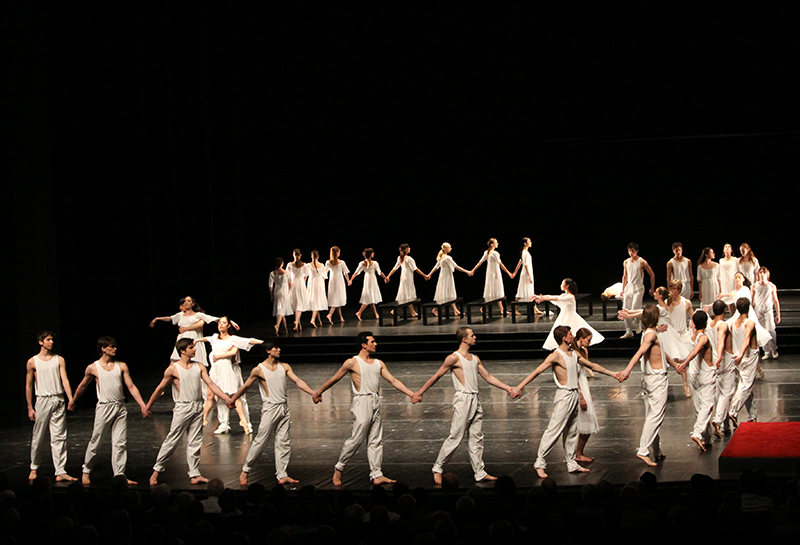
Messiah
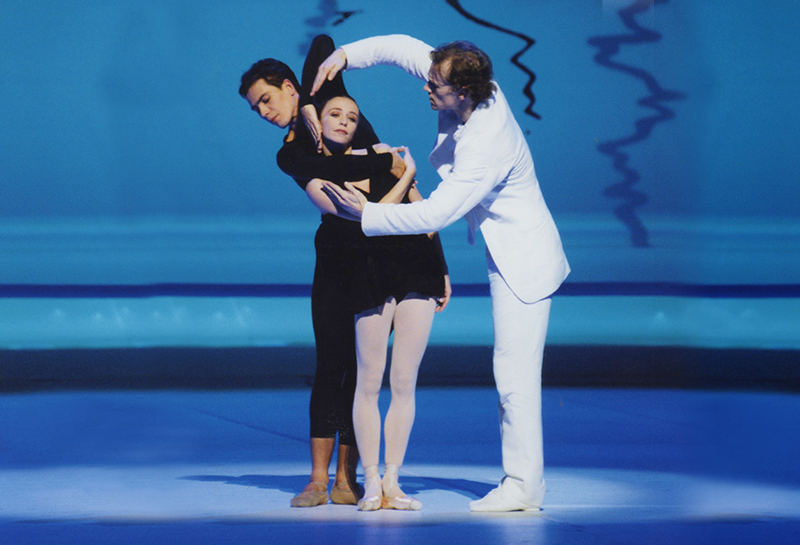
Death in Venice
Photos:Holger Badekow
2015年11月20日
Schedule
DATE
Die Csárdásfürstin
Saturday 14 May 2016, 3:00p.m.
Sunday 15 May 2016, 3:00p.m.
Monday 16 May 2016, 3:00p.m.
Die Fledermaus
Thursday 19 May 2016, 6:30p.m.
Friday 20 May 2016, 6:30p.m.
Saturday 21 May 2016, 2:00p.m.
Sunday 22 May 2016, 2:00p.m.
Die Lustige Witwe
Thursday 26 May 2016, 6:30p.m.
Friday 27 May 2016, 6:30p.m.
Saturday 28 May 2016, 2:00p.m.
Sunday 29 May 2016, 2:00p.m.
Venue
Tokyo Bunka Kaikan (Ueno)
Admission (tax inclusive)
| Category S | \39,000 |
| Category A | \34,000 |
| Category B | \29,000 |
| Category C | \23,000 |
| Category D | \18,000 |
Category S~D tickets go on sale at 10:00 AM on December 12! Book now
| Category E | \14,000 |
| Category F | \10,000 |
Category E ~F tickets go on sale at 10:00 AM on November 29! Book now
 To buy Ticket for inquiries, contact
To buy Ticket for inquiries, contact
Japan Performing Arts Foundation(NBS) |
2015年11月 1日
Schedule
DATE
LILIOM
Friday 4 March 2016, 6:30p.m.
Saturday 5 March 2016, 2:00p.m.
Sunday 6 March 2016, 2:00p.m.
GALA: THE WORLD OF JOHN NEUMEIER
Tuesday 8 March 2016, 6:30p.m.
Wednesday 9 March 2016, 6:30p.m.
A MIDSUMMER NIGHT'S DREAM
Friday 11 March 2016, 6:30p.m.
Saturday 12 March 2016, 2:00p.m.
Sunday 13 March 2016, 2:00p.m.
Venue
Tokyo Bunka Kaikan (Ueno)
Cast
LLILIOM
Liliom : Carsten Jung
Julie : Alina Cojocaru (Guest)
A MIDSUMMER NIGHTA'S DREAM
Friday 11 March
Hippolyta/Titania : Hélène Bouchet
Theseus/Oberon : Edvin Revazov
Helena : Silvia Azzoni
Demetrius : Alexandre Riabko
Hermia : Anna Laudere
Lysander : Christopher Evans
Saturday 12 March
Hippolyta/Titania : Alina Cojocaru (Guest)
Theseus/Oberon : Carsten Jung
Helena : Leslie Heylmann
Demetrius : Karen AzatyanÂ
Hermia : Florencia Chinellato
Lysander : Jacopo Bellussi
Sunday 13 March
Hippolyta/Titania : Hélène Bouchet
Theseus/Oberon : Edvin Revazov
Helena : Carolina Agüero
Demetrius : Alexandre RiabkoÂ
Hermia : Anna Laudere
Lysander : Christopher Evans
Admission (tax inclusive)
| Category S | \23,000 |
| Category A | \20,000 |
| Category B | \17,000 |
| Category C | \14,000 |
| Category D | \11,000 |
| Category E | \8,000 |
All tickets go on sale at 10:00 AM on November 29! Book now
 To buy Ticket for inquiries, contact
To buy Ticket for inquiries, contact
Japan Performing Arts Foundation(NBS) |